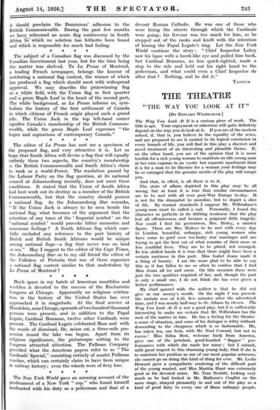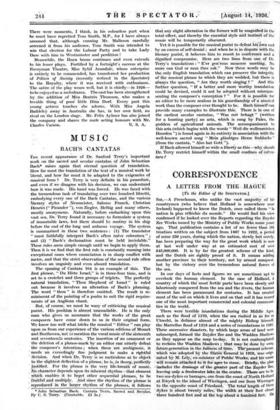THE THEATRE
The Way You Look At It is a curious piece of work. The title is apt. Your enjoyment or otherwise will quite definitely depend on the way you do look at it. If you are of the modern school, if, that is, you believe in the equality of the sexes, and are prepared to see it carried to its logical conclusion in every branch of life, you will find in this play a discreet and novel treatment of an interesting and plausible theme. If, on the other hand, you are of the opiniod that it is more terrible for a rich young woman to maintain an idle young man at her own expense in an exotic but separate apartment than it is for a man to do likewise for a woman your feelings may be so outraged that the genuine merits of the play will escape you.
And that, in effect, is all there is to it.
The state of affairs depicted in this play may be all wrong, but at least it is true that similar circumstances are to be met with all over post-War Europe to-day. It is not for the dramatist to moralize, but to depict a slice of life. By normal standards I suppose Mr. Wilbraham's young man must be called a cad. Personally, I found the character so pathetic in its drifting weakness that the play lost all offensiveness and became a poignant little tragedy. Nor could I find his protectress, Mrs. Risley, a sinister figure. There are Mrs. Risleys to be met with every day in London, beautiful, unhappy, rich young women who have come to grief over too-hasty war marriages and are trying to get the best out of what remains of their more or less youthful lives. They are to be pitied, not scourged. In less skilled hands it is true that there might have been a certain nastiness in this part. Miss Isabel Jeans made it a thing of beauty. I am the more glad to be able to say this as it has fallen to me so often to confess that I find Miss Jeans all ice and snow. On this occasion these were just the two qualities required of her, and, though the part is only a small one, I do not think she has ever given a better performance.
My chief quarrel with the author is that he did not give us our money's worth. On the night I was present the curtain rose at 8.45, five minutes after the advertised time, and I was nearly half-way to St. Albans by eleven. the
Way You Look At It is not a good play, but it is sufficiently interesting to make me certain that Mr. Wilbraham has the root of the matter in him. He has a feeling for the theatre a sense of situation, and some of his dialogue is witty without descending to the cheapness which is so fashionable. He,
has taken tea, one feels, with Mr. Noel, Coward, but not to excess ! Miss Edna Best, welcome back from America,
gave one of the petulant, good:hearted " flapper " per- formances with which she made her name ; but I submit, with great respect to this charming young lady, that if she is to maintain her position as one of our most popular actresses, she cannot go on doing this kind of thing for ever. Mr. Leslie Howard gave a sympathetic rendering of the difficult part of the young wastrel, and Miss Martita Hunt was extremely good as his devoted sister. Mr. Tom Nesbitt, looking very much as he had looked in Mr. Malleson's Conflict on the same stage, strayed pleasantly in and out of the play as a kind of good fairy to every one of these unhappy people. There were moments, I think, in his colourless part when he must have regretted Torn Smith, M.P., for I have always assumed that, although cunning Mr. Malleson carefully screened it from his audience, Tom Smith was intended to . win that election for the Labour Party and to take Lady , Dare with him to Westminster and perdition !
Meanwhile, the Ibsen boom continues and even extends to his lesser plays. Fortified by .a fortnight's success at the Everyman Theatre, Miss Sybil Arundale, whose enterprise is entirely to be commended, has transferred her production of Pillar* of Society (recently noticed in the Spectator) to the Royalty, where it was received with enthusiasm. The satire of the play wears well, but it is chiefly—in 1926— to be enjoyed as a melodrama. The cast has been strengthened by ..the addition ,of Mists ,Beatrix Thomson, _ who makes a lovable thing of poor little Dina Dorf. Every part this young actress touches she adorns. With Miss Angela Baddeley away in Australia she has, in her own field, no rival on the London stage. Mr. Felix Aylmer has also joined the company and shares the male acting honours with Mr.



































 Previous page
Previous page